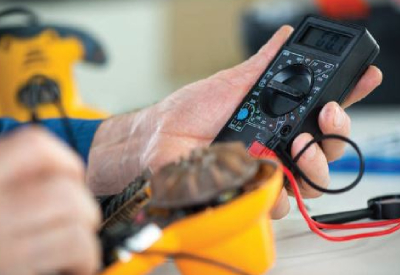Electricians Worldwide: Common Mistakes & Best Practices

May 20, 2021
By Fluke Corporation
Although there are different codes and standards for electrical systems around the world, it’s probably no surprise that electricians and maintenance techs from Canada to Australia and Pakistan to the Philippines share many of the same experiences and learn the same lessons.
In a recent Fluke New Plus survey, more than five dozen professionals laid out the most common mistakes they have seen and some best practices they have developed over their careers. Some narrowly avoided a tragic incident, learning valuable lessons as a result – albeit the hard way.
First-Hand Experience
“I witnessed someone checking a 12,470-volt section of switch gear with a 600-volt meter,” recalled a journeyman electrician who works in a healthcare facility. “Not pretty. The meter blew up and the insulation on the leads was not enough to prevent shock. This resulted in an electrician getting the defibrillator used on him three times to bring him back, and some pretty gnarly burns to boot!”
For an instrumentation associate working in a lab, the lesson was less painful, but more direct:
“While working on an annealing oven for glass, I asked the operator where the circuit disconnect was. He pulled down the handle on a nearby box and the lights in the control panel and controller went off. I started removing wires from the control terminal strip when my screwdriver shorted 240 V to ground, causing a huge arc and a loud bang. Fortunately, I was not injured, but that was how I learned to check for ‘other sources’ before touching terminals.”
Then there’s the master electrician who works in plant service. “I took 480 V through my hand and out of my leg when a disconnect failed to cut power,” he said. “Hurt lots.”
For an engineer, the pain was mainly psychological. “Many years ago, close to the age when dirt was first discovered, I was measuring a voltage that I knew was there but could not get a readout,” he said. “Tried and tried but nothing. Finally, I looked at the meter. I forgot to switch it from off to on. Hello!”
Pop Goes the Meter
What’s the most common electrical measurement mistake these pros have seen? The winner is a little family of errors, all based on using the digital multimeter (DMM) on an incorrect setting.
“Switching from volts range to current range on multimeter, with leads still connected,” is how an electrical safety inspector in Canada described it. “Using wrong selection (ac instead of dc or have it on ohms instead of voltage),” said a plant electrician in the USA.
Another plant tech shared his pain: “The one for me is checking voltage and then wanting to check ohms…this happens, and I say dagonnit, I did it again…” And another time, “when I was checking for milliamps and had it set on volts…wow, that was a shocker.”
“Checking ac voltage on dc position or vice versa,” said a reliability technician in an industrial paper machine facility. “Checking the circuit current by placing the amp meter (non clamp-on) in parallel with the circuit, causing a system upset.”
“Meter on ohms measuring 600 volts,” said a Canadian tech. “Lead blew across the room.”
“Wrong meter setting,” said another tech in Canada. “I had my meter in ac volts and my red lead in the current pin.” “Wrong scale or wrong setting,” echoed a healthcare maintenance electrician in the USA. “Going from continuity to volts and not changing the setting . . . and pop goes the meter.”
Words from the Wise
These professionals may have made some common errors but asked what advice they would have for their fellow electricians, they got dead serious. With few exceptions, they focused on safety.
“Double-check everything,” said an Australian technician. “Don’t always trust the test instrument.”
“Always work as if you were on live current,” said a construction electrician from Quebec, “and lock or disconnect everything you can, so you don’t have to work on live electricity.” A master electrician in the USA agreed. “Always check, recheck, and triple-check for voltage,” he said. “Rarely is there an instance where working on live equipment is really necessary.”
A Canadian plant technician made a similar point. “Always test your work area after lock-out/tag-out has been completed,” he said, “and never trust what labels say on panels. Things change and some people do not notate changes.”
“Always know what you are working on and not only verify if there is power on the circuit, but what the voltages actually are,” said an electrician who works on a rolled sheet metal galvanizing line.
“Always make sure it is dead and locked off. ALWAYS!” said a third-year apprentice in the USA. “And if you don’t do anything else ALWAYS make sure you have an excellent ground!”
Several survey respondents, from Canada and elsewhere, focused on the safety basics. “Always have the proper PPE on, and always check your instrument and leads before you use them,” said one.
A service technician added this: “Work live only to test. Work live with a partner. Follow CTC: Confirm the tester works on a known circuit, Test the circuit in question, then retest on the known circuit again and Confirm that the tester is functioning properly. BASIC stuff. Always meticulously follow the pattern you were taught, don’t vary. The JW or instructor had a reason, usually safety, for training you on that procedure in that way.”
The pros we surveyed gave us lots of great advice, but the best might also be the briefest. As a plant technician in Canada put it:
“Slow down and think.”
Reproduced with Permission, Fluke Corporation





![Guide to the Canadian Electrical Code, Part 1[i], 26th Edition– A Road Map: Section 56](https://electricalindustry.ca/wp-content/uploads/2022/11/Guide-CE-Code-2-768x432.png)




![Guide to the Canadian Electrical Code, Part 1[i], 26th Edition– A Road Map: Section 56](https://electricalindustry.ca/wp-content/uploads/2022/11/Guide-CE-Code-2.png)



